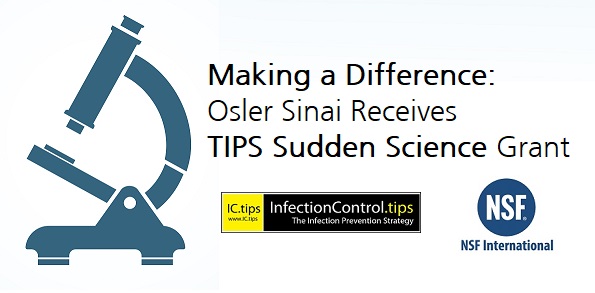At the beginning of 2018, Infectioncontrol.tips, in conjunction with The Infection Prevention Strategy and NSF International Applied Research Center (NSF ARC) announced a $35,000 USD grant that would support the development of innovations to improve Infection Prevention and Control. With an overwhelming number of high quality grant submissions from around the world, the grant review committee had a difficult time deliberating on the grant that would deliver the greatest impact. Lead by Drs. Sergio Borgia and Allison McGeer from William Osler Health System (Brampton, Canada) and Sinai Health System (Toronto, Canada), respectively, was awarded the Sudden Science Research Grant. The project aims to evaluate the effectiveness of drain cleaning protocols in randomized control trial.
The InfectionControl.tips, TIPS and NSF ARC teams would like to thank all applicants, and encourage everyone to Join, Contribute, and Make A Difference.
Study Summary
The emergence of carbapenemase-producing Enterobacteriaceae (CPE) has led to worldwide concern for the clinical impact of these highly drug resistant gram-negative bacteria for which there are few treatment options. The CDC and WHO have listed CPE among the top ten threats to global human health. Sinai Health System is an internationally recognized centre of excellence in infection prevention. William Osler Health System (WOHS) is situated in the Region of Peel and is home to over a million foreign born residents in a geographic area that contains among Canada’s highest burden of surveillance and clinical CPE isolates.
Hospital water environments, particularly sink and shower drains, have been reported as a reservoir for and source of CPE infection in patients. Though CPE colonization of health care facility water drains is well reported in the medical literature, the optimal treatment of contaminated building waste water systems remains to be definitively established. Developing standard methods to decontaminate drains and building plumbing systems is therefore of interest to the public health and safety of any heath care facility and its patients.
This project aims to develop and evaluate a standard method for decontamination of drains. We will do this using drains that have previously tested positive for CPE. Each drain will be randomly assigned to current standard cleaning or newly developed CPE decontamination; and contamination by CPE followed in these drains for 6 months. The project is a collaborative venture between Sinai Health Systems and William Osler Health System and will span multiple clinical care areas across two large tertiary care hospitals over a period of 9-12 months. The findings will be used to inform questions pertaining to the longitudinal colonization of drains with CPE as well as to asses the effects of systematic protocolized decolonization on drains harbouring CPE. We hope to be able to provide guidance to hospitals about when and how testing of drains and drain decontamination should be managed.












